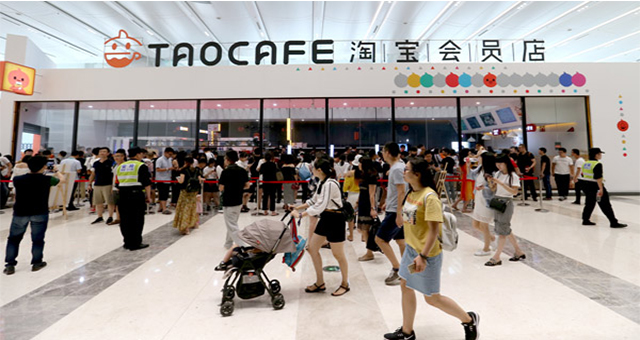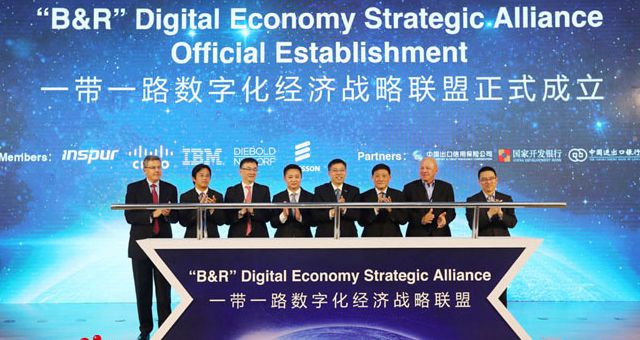
Binhai New Area Cultural Center opened in TJFTZ
Located in Tianjin Pilot Free Trade Zone, the Binhai New Area Cultural Center is a comprehensive facility that combines a library, a show center, an exploration hall, a citizen activity center and a cultural corridor. The external architecture of the cultural center is eye catching and, in a word, astonishing.In the library, the most prominent feature is the spherical multi-functional hall. The outside of the hall is covered with 400,000 LED lights and the interior is perfectly designed to play movies. That is why the library is also called "The Eye of Binhai". Inside, the hall can hold lectures and seat up to 200 people. The library has 1500 seats in its reading area and its collection is expected to reach 1,350,000 books. The book collection includes both paper and digital editions and can meet people's needs for reading around the clock. Book sales and events such as book signings and reading salons will be regularly held in this part of the library.
Li seeking new ideas to give the economy boost
China will redouble its efforts to improve the quality of its products and services-as well as its capacity for innovation-to ensure healthy, stable economic growth in the coming year, Premier Li Keqiang said. Li made the remark at a State Council seminar that was attended by economists and business representatives at the Zhongnanhai compound in Beijing. The seminar aimed to analyze China's current development and seek policy recommendations on the country's economic strategy for the coming year. The country's economy grew more than expected in the past year, which has provided a powerful response to those who predicted a hard landing, Li said. "In the past, we have spared no effort to encourage investment," he said. "Now we need more ideas and actions to boost consumption so the economy will grow in a healthier and more sustainable manner." China's economy grew at an annual rate of 6.9 percent in the first three quarters of this year. Final consumption accounted for 4.4 percentage points (64.5 percent) of that growth, with the rest coming from investment and net exports, according to the National Bureau of Statistics. Urging the government to fully implement the strategies approved during the 19th National Congress of the Communist Party of China, Li said the economic work plan for 2018 will be connected with the goal of building a moderately prosperous society in all respects. "As China is now deeply integrated into the world economy, we need to stay aware of various potential risks from outside," Li said, adding that structural contradictions in the Chinese economy still exist. He said the biggest potential for China's future growth lies in the country's rich human resources. "Recent years have seen amazing potential unleashed from the people, with the government streamlining administration and encouraging mass innovation and entrepreneurship," Li said. "We will stand firmly with these efforts to help people to unleash their creativity and create value." The government will continue to cut taxes for businesses to give full play to the role of the market and encourage mass entrepreneurship, he said. In the first nine months, high-tech manufacturing represented 13.1 percent of the year-on-year growth. Among the representatives who spoke with the premier at the seminar was Bai Chongen, deputy executive dean of the School of Economics and Management at Tsinghua University. Bai, a former member of the People's Bank of China monetary policy committee, said it was "encouraging to see that the government has been moderating its annual growth target" over the past several years. "This means we are giving increasing attention to fixing the economic structure in the long term," he said.
China expected to complete first sea launch for commercial payloads in 2018
China is expected to complete its first sea launch for commercial payloads in 2018, said Yang Baohua, vice general manager of China Aerospace Science and Technology Corporation (CASTC). Yang made the remarks at an annual academic conference on space science held from November 1 to 2 in Beijing. The service will also be provided in other regions in addition to its four major sites in Jiuquan, Taiyuan, Xichang, and Wenchang, Yang noted. At the conference, Yang introduced the company’s experience, competence, and advantages, as well as its on-going commercial aerospace programs, and also evaluated the prospects of the commercial space industry. “CASTC is dedicated to offering various commercial launching solutions to meet the market demands of low cost and fast preparation,” Yang said. Key technological tests will be conducted for the sea launch of the Long-march rocket family this year, according to Tang Yagang, deputy director of carrier rocket development at the China Academy of Launch Vehicle Technology. The commercial service is expected to be available for international users in 2018. By then, the Long-march rockets will be able to send 500-kilogram satellites to an altitude of 500 kilometers above Earth, at an inclination of 0-10 degrees. In recent years, with the growing demand for launching near-equatorial and low-inclination satellites from countries near the equator, sea launch service has become an area of fierce competition among space powers.
Foreign investment law enactment progresses
The enactment of China's new foreign investment law is progressing well, as the draft has been submitted for further discussion by the central government, the Ministry of Commerce announced on Thursday. The move illustrated the country's desire to accelerate the modernization of its market access system, as well as strengthen the use of fair and transparent market principles. Gao Feng, spokesman for the ministry, said the law is expected to serve as a basic guideline for the reform of regulations on foreign direct investment. "The government will protect the legitimate rights of foreign investors and foster a stable, transparent and law-based business environment," Gao said at a regular news conference in Beijing. The ministry will collaborate with the Legislative Affairs Office of the State Council to speed up the lawmaking pace in the next stage, he added. For the past several years, China has been ramping up efforts to expand investment access and unify laws and regulations while applying stable, transparent and predictable policies to foreign investment. The government has already introduced a negative-list approach in 11 pilot free trade zones to simplify the process for foreign investors in setting up their business presence in China. The negative list specifies investment sectors that are off-limits to foreign investors and opens industries not on the list, providing equal treating to overseas and Chinese companies. Gao said the ministry will replicate nationwide the negative-list approach used in its free trade zones. The negative list covers 15 sectors such as mining, leasing and financing. Among the sectors, 40 categories and 95 special management measures are included. Wei Jianguo, vice-president of the China Center for International Economic Exchanges, said the move provides a consistent national treatment for market entrance and reflects a major step forward in liberalizing the Chinese market for overseas investors. Researchers at accounting firm PricewaterhouseCoopers said in a report that the adoption of a negative list in the market access system apparently makes it easy for companies to invest in businesses that are neither prohibited nor have limited access. "The approach also strengthens post-investment supervision and enables sharing and publication of information.... Not only those businesses in FTZs will be affected, companies from outside of FTZs will sooner or later be affected," said the report. In the first nine months, China's FDI inflows grew by 1.6 percent year-on-year, compared with a 0.2 percent drop between January and August, according to the Ministry of Commerce. Zhang Jianping, a senior researcher at the Chinese Academy of International Trade and Economic Cooperation under the Ministry of Commerce, said while there were concerns about withdrawal of foreign investment in the past, the FDI structure has improved. "The FDI inflow is still growing, which can offset the outflows."
Shanghai FTZ to provide more convenient services for foreign companies
Shanghai Free Trade Zone has recently worked out a cooperation memorandum to provide more convenient services for foreign companies. The memorandum involves Foreign Affairs Office of Shanghai Municipal People’s Government, Shanghai Entry-Exit Inspection and Quarantine Bureau, Shanghai Municipal Public Security Bureau, and Shanghai Free Trade Zone Administration. With relevant documents ready, foreigners in the zone can now enjoy the one-stop service for foreign company registration, two-to-five years application of foreigner’ residence permit, identification of foreigners of Chinese origin, green channel of healthcare service and permanent residence permit for high-level management professionals. In line with the direction of the State Council and Shanghai Municipal Government, the FTZ will provide better service and policies to companies in the zone and attract more international talents to work in Shanghai.
International business alliance set up to support Digital Silk Road
A Belt and Road Digital Economy Strategic Alliance on Thursday announced its establishment in Ji’nan, eastern China’s Shandong province, aiming to integrate world-class IT resources for the Digital Silk Road. The alliance was initiated by Shandong-based e-information technology company Inspur and co-founded by international big names including Cisco, IBM, Diebold Nixdorf, and Ericsson. The founders vowed to integrate their cutting-edge IT products, technologies, and solutions to accelerate the construction of the Digital Silk Road. Three Chinese national financial institutions are also members of the alliance, the Export-Import Bank of China, China Development Bank, and China Export & Credit Insurance Corporation. It is reportedly the first platform set up by global technology giants to serve the Belt and Road Initiative. “Inspur hopes to partner with top technology companies in the world and China’s national financial institutions, help countries along the Belt and Road to solve their insufficient funding and technical problems in informatization construction, and bring the benefits of digital economy development to people there,” Peter Sun, Chairman and CEO of Inspur Group, said at the alliance launching ceremony. Countries along the Belt and Road will be able enjoy services provided by the alliance, including new datacenters, cloud services, smart finance, smart home, smart taxation, smart cities, and other total technology solutions. Projects will first be launched in South Asian and African countries, such as Thailand, Bangladesh, Malaysia, Nigeria, Ethiopia, Tunisia, Tanzania, Zambia, and Kenya. More companies with top informatization products and technologies from across the globe will be gradually invited to join the alliance together with more financial institutions.

Please leave us a message and we will get back to you shortly.

If you want to learn more information about investing in China, please leave your email address, we will send you the relevant information and article every month.
 0086-10-53270173
0086-10-53270173 china@tanikawa.com
china@tanikawa.com











